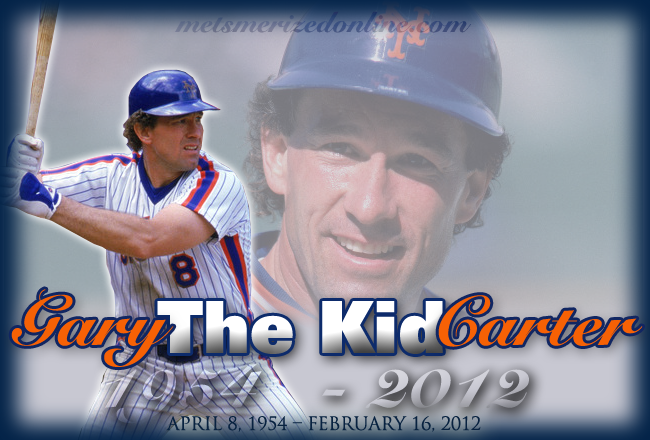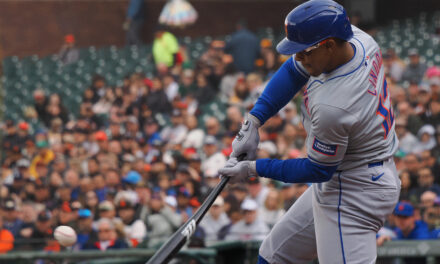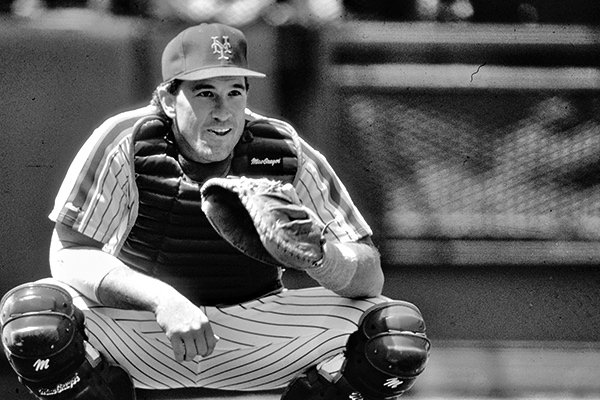
Remembering Gary Carter on the four year anniversary of his death. He was a great baseball player, a tremendous family man, and the best friend anyone could ever have. Most of all, he will always be remembered as The Kid to all who knew him because of his passion and enthusiasm for life and for baseball. We miss you, Gary…
Keith Hernandez flied out to center for the second out of the inning. A tomb-like silence fell over Shea. Fans stared in disbelief. The 108 regular season wins plus six more in the post-season meant nothing. Vin Scully announced Marty Barrett was chosen player of the game.
And then…Number 8 stepped to the plate.
In a career that spanned nearly 2,300 games and 8,000 at-bats over 19 seasons, there are many memorable moments. However, the defining moment of his hall-of-fame career, what typified Gary Carter, was something that happened OFF the field.
“The Mets are still alive,” said Scully as Carter lined a 2-1 offering into left.
In Spring Training 1974, Expos teammates Ken Singleton and Mike Jorgensen chided the exuberant rookie. 19 year old Gary Carter was trying to win every sprint, hit every pitch over the wall. His childlike enthusiasm for the game prompted them to call him ‘The Kid.’
As a late September call-up, “The Kid” made his major league debut. He caught the back end of a double header against the defending NL Champion Mets. He went 0-for-4.
Baseball is and always will be a game of stats. But sometimes even that, no matter how impressive they may be, do not accurately measure the impact of a player. Sure, Gary was an 11 time All-Star, five-time Silver Slugger, two-time MVP of the All-Star Game and winner of 3 Gold Gloves. He hit 324 career home runs and batted in 1225. But that did not define him.
“And the Mets refuse to go quietly,” said Vin Scully, after Kevin Mitchell singled and Carter moved to second.
The road to the Championship began in 1983. In May, the Mets brought up highly touted rookie Darryl Strawberry. Just weeks later, Frank Cashen sent Neil Allen to STL in exchange for former MVP and proven winner Keith Hernandez. 1984 saw the debut of rookie phenom Doc Gooden. But still, something was missing. The crème de la crème came in December 84 when Gary Carter joined the Mets. “He was the final piece of the puzzle,” explained Keith.
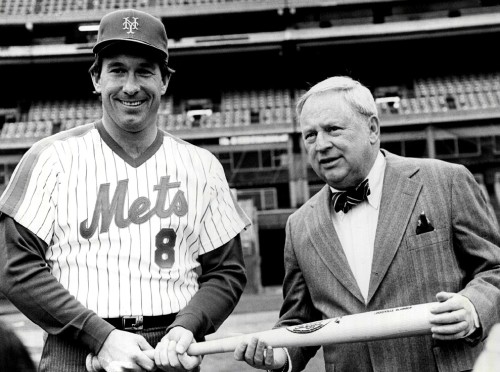
On April 9, 1985, one day after his 31st birthday, Gary made his debut with the Mets. He hit a solo HR in the 10th off of Neil Allen to give the Mets a 6-5 Opening Day victory. With that blast, Gary won the hearts of Mets fans everywhere. But that moment did not define him.
Gary had an infectious smile. He was the media darling, always willing and ready to give an interview or answer a question. Some referred to him in a derogatory way, calling him ‘Camera Carter,’ accusing him of being the ultimate self-promoter. Gary was not that. He was, however, the consummate professional.
During his tenure with the Mets there were plenty of fist raising curtain calls. Even when he struck out, he’d walk back to the dugout, looking down, shaking his head twice, disappointed with himself but most likely already planning how to adjust in his next at-bat. But the curtain calls and raised fists did not define him.
Let’s be honest. That 1986 team were not exactly boy scouts. They were a bunch of brawling, boozing, hell raisers. Gary, however, was a boy scout. Hell, he even did a commercial for Ivory Soap! But yet, in spite of the fact that Gary may not have fit in with the recklessness of Keith, Darling, Ojeda, Knight, and Darryl, he was still loved by the fans and respected by his teammates. (anyone remember Gregg Jefferies?). However, this was not Gary’s defining trait.
A quarter of a century has now passed since that fateful Game 6 but yet we all remember it like it was yesterday. It was our beloved number 8 who started not only the greatest rally in Mets history, but quite possibly the most amazin’ comeback ever in a World Series.
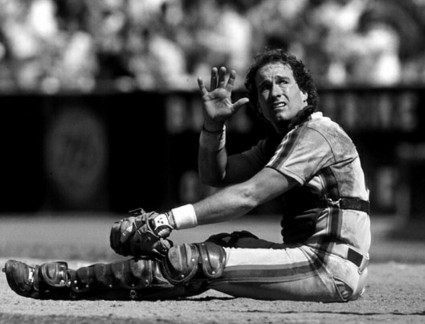
In the top of the 7th, Boston took a 3-2 lead and was threatening for more. Rich Gedman singled through the left side and Jim Rice rounded third base. Mookie Wilson fired a rocket to the plate and Carter executed a perfect tag on Rice to keep the Mets within one. Had Carter not made the tag things would be very different. In the 8th, it was Gary’s Sac Fly that tied the game at 3-3. But these were not his defining moments either.
This, however, did define Gary. When Ray Knight singled, Carter raced home, bringing the Mets to within a run . He stepped on the plate, defiantly pointed at on deck batter Mookie Wilson. As Gary entered the dugout, he high fived several players, took a breather. And what did he do then? He looked around for his catching gear!
The Mets were trailing 5-4, two outs bottom of the 10th. But yet, in spite of being behind, Gary was preparing to come out for the 11th inning. The entire 86 season, the entire never-say-die attitude of that ’86 club, was captured right then and there. What must Boston have thought when they saw that? That one simple act, something Gary did while not even on the field, not only summed up the Mets attitude that year, but more importantly the eagerness of The Kid. He still wanted to play more baseball.
Mookie Wilson said, “Gary was one of the happiest guys in the world.” “I relied on Gary for everything when I was on the mound,” stated Doc Gooden. “He was a warrior on the field.” Battery mate Ron Darling said, “Gary was everything you wanted in a sports hero; great talent, great competitor, great family man and a great friend.”
However, it was Gary’s manager, Davey Johnson, who perhaps summed it up best. “I loved him very much.” We all did, Davey. And always will. Gary may have only worn the blue and orange for only five seasons, but his memories will last a lifetime.

